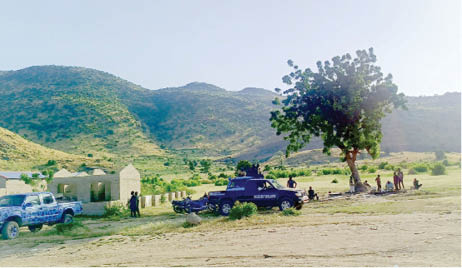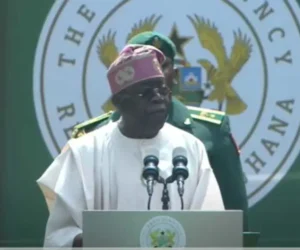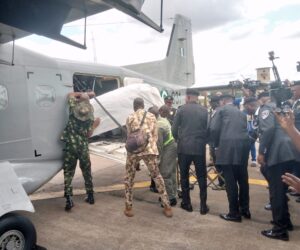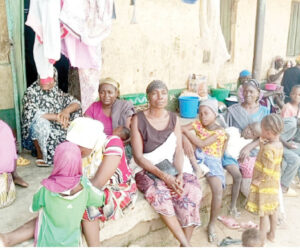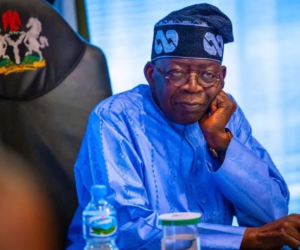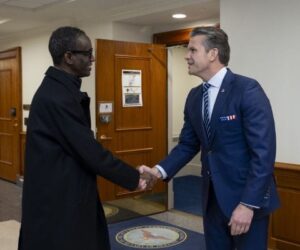A stream of water can be seen trickling down a sandy riverbed, which dozens of residents in Kirawa and Kerawa are critically dependent on for home use and irrigation.
Nestled in the mountains of Mandara, a Boko Haram enclave, this river demarcates the towns, leaving one half in Nigeria and the other in Cameroon.
A little upstream, one can see the residents of Kerawa (in Cameroon) resting cheerfully as they chat and carry out peaceful trading activities under the protection of Cameroonian soldiers. At the other side lies the Nigerian Kirawa town, where visitors are welcomed by the gory sights of carcasses of homes and vehicles with panicking faces of residents cohabiting under duress.
SPONSOR AD
Both towns, one colonised by the British, the other by French, perfectly fit into the mountainous area, covered by lush green vegetation, under a dazzling golden sun.
Sitting on a rocky desert, these remote nature towns, a distance of 100km from headquarters of Gwoza Local Government Area and 20km from Kolofata subdivision in Cameroon are perfect places for nature lovers, hikers and even tourists.
However, the insecurity situation in the area has made this beautiful landscape a site unattractive for the inhabitants and visitors alike.
On a reporting visit to the town, Weekend Trust observed how the residents of Kirawa and Kerawa coexist peacefully and interact as dwellers of a single indivisible town.
One neighbour helped the other survive in 2014 when Boko Haram overran Kirawa and forced the residents to flee, leaving behind homes, schools and memories of their once a vibrant town.
It was gathered that Kerawa families, friends and good Samaritans welcomed the Nigerian neighbours, especially women and children in their francophone homes. They shared food, farmlands and business spaces with them.
Our correspondent gathered that they hosted them for eight years until the Borno State governor, Prof Babagana Umara Zulum, repatriated them in 2022.
But the insurgents renewed their deadly attacks in February, July, August and September, 2025, targeting civilians and the only Cameroonian troops protecting them.
Early September, the Cameroonian troops under the Multinational Join task Force (MNJTF) abandoned the position after the August 7 attack that led to the killing of four soldiers.
Spending day in Nigeria, night in Cameroon
The residents, who are yet to recover from the shock of the recent attack, which left two people dead and over 50 houses burnt, said the situation forced them to cross to the other side in Cameroon to spend the night and return to Nigeria in the morning.
Many others said they had relocated permanently there to live with their relatives in search of the lost peace on the Nigerian soil.
This situation shows how a person can live in different security situations and in different social lives.
“It is no longer news that we spend the day in Kirawa and night in Cameroon for safety. Surprisingly, 100 meters into Kerewa will suffice.
“Most of the people you see hardly sleep at night because the presence of Nigerian securities personel here has become a rare luxury. We only have Civilian JTF that can’t withstand Boko Haram with Dane guns. Our lives are always at risk,” he said.
Fati Mala said that on the day of the last attack, she heard a distant gunfire and alerted her family, but it grew louder.
“A few minutes later, the town was filled with the sounds of heavy blasts and gunshots and people started running to the border. Our aged father was sick and could not walk, so we ran and left him behind,” she said.
She explained that the incident happened around 9am, and when they returned the following morning, she found her father outside while the house was burnt down.
“From the border gate, we watched the Boko Haram insurgents setting fire to our houses and people’s vehicles. Many families slept there under the protection of Cameroonian troops,” she said.
How Cameroon neighbours are becoming heroes
Mohammad Musa, a resident of Kerawa town, said that on the night of the attack on Kirawa, over 40 women and children slept in his house.
“And many houses in Kerawa did the same. Each time there is an attack you will have hundreds of people crossing over from Kirawa to take shelter here.
“That boundary you see is just an artificial demarcation for administrative convenience; the truth of the matter is that we are bound by common beliefs, customs and culture,” he said.
He said that within eight years, the town had received thousands of Nigerian refugees ranging from friends, families, and even strangers.
“We share our food, farmlands and business spaces with them. Some have built houses, businesses and even married here, so many would not return to Nigeria, no matter the peace gain,” he said.
Nigerian refugees speak Despite the help that Kirawa refugees received from their kind neighbours in Cameroon, many of them complain about the nonchalant attitude of the federal government to their plight.
“Our daily lives are full of small struggles that some people and the government would see as trivial, but to us, clean water is a precious commodity.
“Finding a restroom is often a challenge; and we hardly know where our next meal would come from,” one of the refugees, Yaa Falmata lamented.
Our correspondent observed that behind most of the wary faces interviewed, there were heartbreaking stories.“We have for long been neglected by the Nigerian government and security agencies. Since our repatriation in 2014, we have been protected by the Cameroonian soldiers.
“We tried our best to see that a Nigerian military base was stationed in the town, but they left us porous, even after the withdrawal of the Cameroonian soldiers,” another refugee, Abba, said.
Those who stayed back said the economy of their town was brought to its knees after business and farming activities came to a halt.
“Our weekly market that once attracted traders from far and near has shrunk drastically. We abandoned our farmlands after we invested huge amounts of money. The farms were taken over by weeds,” he noted.
Weekend Trust observed that the deepening hardship of internally displaced persons and refugees in Cameroon is due to the collapse of livelihoods, cutting off both food supplies and sources of income.
“Our community has been left to secure itself. Since the withdrawal of Cameroonian soldiers, we have been abandoned in the middle of nowhere. If soldiers cannot be stationed here, how can ordinary people survive?” Ali Kirawa said.
I notified the Nigerian military of the dangers of leaving Kirawa without security – Zulum
Governor Babagana Umara Zulum, who went on assessment visit to Kirawa recently, said the incessant attacks on the town had left lives and property destroyed.
“Two lives were lost, while 50 houses and our heavy-duty truck, equipment and eight vehicles were burnt down. We thank God that the casualties were not much,” he said.
He said the town was resettled seven years ago with the support of Cameroonian soldiers. Unfortunately, they were displaced by the insurgents.
“I duly notified the Nigerian military of the dangers of leaving this town without security. Unfortunately, my request did not receive the deserved attention and the insurgents came on Wednesday and vandalised everything we worked so hard to rebuild,” he said.
Zulum regretted that private and public structures were destroyed after his administration rehabilitated the schools, hospital and other facilities in the town years ago.
“Fortunately, the school was intact, but the dispensary has been destroyed. I want to assure you that very soon, we will build a befitting general hospital. This is a border town, so the hospital would serve not only the people in the Nigerian community but across Cameroon.
“Aside this, I promised the community to rehabilitate the destroyed houses and look into the possibility of compensation to some of the members of the community that have lost their assets,” he said
However, the case of incessant attacks on Kirawa is not isolated; inhabitants of other resettled Nigerian border communities are now fleeing to neighbouring countries, claiming lack of enough security presence.
Seven more border towns face similar attacks, complaints
Residents of Banki, Baga, Damasak, Wulgo, Banki, Malamfatori, Ngala border communities said that whenever they were under attack, Chad, Niger and Cameroon would be their safe refuge.
Weekend Trust reports that Borno is the only state in Nigeria that shares borders with three countries: Niger, Chad and Cameroon.
These returnee communities were resettled after years of displacement by the Boko Haram insurgents, with some living as refugees in those countries.
However, with the resettlement project by Governor Zulum, many of them were repatriated with improved security.
But many of them alleged that adequate security was not provided to them; hence the deadly attacks that led to the killing of over 200 people within 10 months.
Timeline of attacks on border towns
In March 2025, Boko haram fighters attacked Wulgo border village to Cameroon and killed 12 soldiers, while many others were injured. The Cameroonian Ministry of Defence (CNA) confirmed the attack.
On May 16, 2025, at least 23 farmers and fishermen were brutally killed by the fighters of the Islamic State West Africa Province (ISWAP) in Malam Karanti, close to Baga, a border to Niger and Chad.
This attack came barely five months after the terrorists killed at least 40 farmers at Dumba Island, a few kilometers from Baga town, on January 10, 2025.
One of the survivors told Weekend Trust that the victims were attacked in their farms around 3pm.
On September 5, 2025, Boko Haram terrorists killed more than 60 people in an overnight attack in Darul Jamal village, close to Banki town on the Nigeria-Cameroon border.
The Nigerian Air Force said it killed 30 militants in strikes after receiving reports of the raid on the village, where residents recently returned following years of displacement.
Zulum mobilises fighters to border communities, encourages resistance
Governor Zulum has mobilised Civilian JTF fighters and hunters to fight Boko Haram insurgents on the sideline with troops to Kirawa and other border towns
This followed the withdrawal of Cameroonian soldiers stationed in the town.
The governor said he had a fruitful meeting with the theatre commander and the commander of the Multinational Task Force on the protection of lives and property of the returnees.
“All of us have agreed that within the shortest possible time, the Nigerian army will deploy soldiers to Kirawa town.
“The second measure we have undertaken is in the area of providing support to our gallant Civilian JTF and vigilante. I listen to them and we will provide them with the needed equipment to safeguard the town.
“Most importantly, we are looking into the possibility of getting some modern technological equipment that would address insecurity challenges in the general area.
“Also, we are strengthening the resilience of the community to defend themselves. They need not to panic. I see no reason why very few members of Boko haram will come to defeat the entire community without resistance,” he said.
He also pleaded with the Nigerian military to be more committed, saying that what matters is not the number of soldiers needed to keep here but how committed they are to fight back the terrorists during military operations.
“Above all, we need military operations. For sometimes, military operations were not conducted in Borno State, and that has been instrumental to what we have been witnessing now – renewed insurgence attacks.
“We are pleading with the federal government and the chief of defence staff to release funds and procure equipment so that the military operations should begin in earnest since the rainy season is about to be over.
“But you have to take note of this very important thing, which is continuing military operations. We need not to just embark on operations and after a few months we slow down or withdraw.
“There is need for us to sustain the military operations throughout. According to the United Nations resolution, it is clearly stated that military operations have to be followed by stabilisation, recovery, reconstruction and resettlement.
“That means that whenever we capture a certain place, we have to put in place mechanisms for all these things, otherwise, all the gains may be futile.
“My only plea to the federal government, as well as the Nigerian military is: Let us do everything possible to ensure that we sustain the peace we achieved, seven or eight years ago,” added.
The governor continued, “Kirawa was never displaced seven years ago when the security situation was very bad, so now that the security is better, I see no reason why Kirawa would be displaced.
“Once Kirawa is displaced, other adjoining communities like Pulka and Ngoshe would also be displaced; and gradually, it will reach Gwoza Local Government headquarters and the road would be cut off.
“I appeal to the military to immediately establish their location in Wulgo. Yes, Cameroonians have withdrawn, but that doesn’t mean that the Nigerian army should leave the area vacant.
“Kirawa is standing now. When you go to Wulgo, the opposite site of Wulgo in Cameroon Republic, their soldiers are on ground keeping their cities and towns secured.
“So, whether we have the Multinational Task Force (MNJTF) on ground or not, there is a need for us to deploy our troops and keep them in their towns.
“Yes, I am aware that the Nigerian army has lean numerical strength, but we have certain strategic towns and villages that have to be kept on ground.
“I want to express my sincere appreciation to the Chief of Army Staff because immediately he heard the information, he took unprecedented measures that would forestall future occurrence.
“Again, the sector commandant and theatre commander convened a meeting; and I believe they have taken very decisive measures.”

